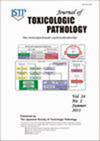亚硝酸盐暴露可能导致小鼠不孕
IF 0.9
4区 医学
Q4 PATHOLOGY
引用次数: 1
摘要
在本研究中,我们研究了亚硝酸盐暴露在小鼠体内诱发不孕的可能性。成年雌性C57BL/6J小鼠被随机分为对照组和亚硝酸盐暴露组。随后,计算小鼠不孕率,并使用苏木精和伊红染色检查卵巢组织的病理变化。此外,还进行了TUNEL染色、免疫荧光标记和蛋白质印迹,以评估不同组卵巢组织中的细胞凋亡和氧化应激反应。我们观察到亚硝酸盐暴露可导致小鼠不孕(p<0.05)。高剂量亚硝酸盐暴露引起不孕具有时间依赖性,两轮暴露引起的不孕率高于一轮暴露(p<0.01)。此外,亚硝酸盐暴露组卵巢闭锁卵泡数高于对照组。此外,在闭锁卵泡的颗粒细胞中观察到TUNEL阳性细胞,在亚硝酸盐暴露后的卵巢中检测到胱天蛋白酶8、c-Fos和诱导型一氧化氮合酶(iNOS)的过度表达(p<0.01),表明亚硝酸盐暴露后诱导了细胞凋亡和氧化应激反应。总之,这些发现表明,亚硝酸盐暴露会以时间依赖的方式诱导小鼠不孕。氧化应激反应和细胞凋亡参与介导亚硝酸盐诱导的不孕。本文章由计算机程序翻译,如有差异,请以英文原文为准。
Nitrite exposure may induce infertility in mice
In the present study, we investigated the potential of nitrite exposure to induce infertility in mice. Adult female C57BL/6J mice were randomly divided into control and nitrite exposure groups. Subsequently, the rate of mouse infertility was calculated, and pathological changes in ovarian tissues were examined using hematoxylin and eosin staining. In addition, TUNEL staining, immunofluorescent labeling, and western blotting were performed to assess cell apoptosis and oxidative stress response in ovarian tissues from various groups. We observed that nitrite exposure could induce infertility (p<0.05) in mice. High-dose nitrite exposure caused infertility in a time-dependent manner, and two-round exposure induced higher infertility than that one-round exposure (p<0.01). In addition, a higher number of atretic follicles were detected in the ovaries of nitrite-exposed groups than in the control group. Furthermore, TUNEL-positive cells were observed in granulosa cells of atretic follicles, and overexpression of caspase 8, c-Fos, and inducible nitric oxide synthase (iNOS) was detected in ovaries after nitrite exposure (p<0.01), suggesting that cell apoptosis and oxidative stress response were induced following nitrite exposure. Collectively, these findings suggest that nitrite exposure can induce mouse infertility in a time-dependent manner. Oxidative stress response and cell apoptosis are involved in mediating nitrite-induced infertility.
求助全文
通过发布文献求助,成功后即可免费获取论文全文。
去求助
来源期刊

Journal of Toxicologic Pathology
PATHOLOGY-TOXICOLOGY
CiteScore
2.10
自引率
16.70%
发文量
22
审稿时长
>12 weeks
期刊介绍:
JTP is a scientific journal that publishes original studies in the field of toxicological pathology and in a wide variety of other related fields. The main scope of the journal is listed below.
Administrative Opinions of Policymakers and Regulatory Agencies
Adverse Events
Carcinogenesis
Data of A Predominantly Negative Nature
Drug-Induced Hematologic Toxicity
Embryological Pathology
High Throughput Pathology
Historical Data of Experimental Animals
Immunohistochemical Analysis
Molecular Pathology
Nomenclature of Lesions
Non-mammal Toxicity Study
Result or Lesion Induced by Chemicals of Which Names Hidden on Account of the Authors
Technology and Methodology Related to Toxicological Pathology
Tumor Pathology; Neoplasia and Hyperplasia
Ultrastructural Analysis
Use of Animal Models.
 求助内容:
求助内容: 应助结果提醒方式:
应助结果提醒方式:


